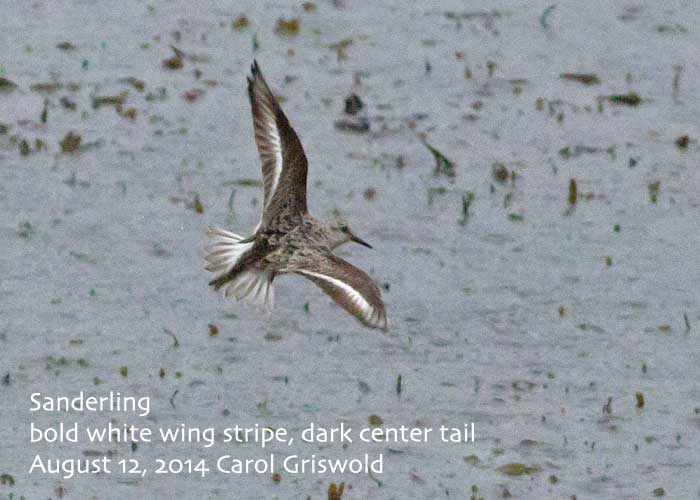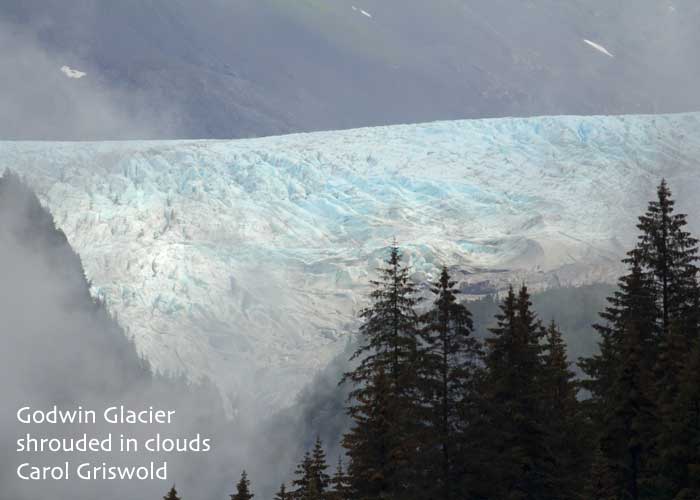A series of storms rolled in
from the Pacific this week delivering heavy rain, sullen gray clouds, rough
seas, and… storm birds. I ventured out around 8 pm to have a look at the
dramatic weather and swollen streams. Snug in my car, I scanned the little
beach just south of the harbor uplands, windshield wipers banging away. A few
rugged fishermen were still flailing away at the tide's edge at the mouth of
Scheffler Creek, trying to snag a big one for the Silver Salmon Derby.
I had to roll down the window
despite the rain to get a better look at about a dozen RED-NECKED PHALAROPES
packed into the corner of the beach by the breakwater below, busily feeding in
the surging wrack. Whenever a wet fisherman walked over, they blew away, but
returned as soon as the coast was clear. It was really fun to watch them, and I
was grateful for the big towel to wipe things down.
Looking up the beach, I
spotted two well-camouflaged juvenile SEMIPALMATED PLOVERS standing stoically,
looking ready for bedtime. A dark gray, almost invisible WANDERING TATTLER
poked through the intertidal rocks. Then, a little light-colored ball appeared,
foraging up and down the piles of wave-tossed seaweed. At least the belly was
white; the back was a mixture of grays and browns. But in the dim and fading
light, the shorebird really showed up. I shot off a bunch of photos, and
managed to get a few of the bird next to a LEAST SANDPIPER for size (bigger),
and a SEMIPALMATED PLOVER (about the same.) At one point, a similar-sized
RED-NECKED PHALAROPE body bumped the bird, just bonked it out of his way!
I wasn't sure who this one was,
so I sent a bunch of photos to the experts on the 'net. Thanks to Buzz and Dave
for letting me know it was a SANDERLING. Seward just doesn't get this species
very often, and in molt, it's confusing. Look for the size, bold white wing stripe
when it flies, black legs and straight black bill.
The next day, I went back
twice to try to relocate the storm birds, but the little beach was absolutely
empty of birds, and full of fishermen and visitors.
In other news, at noon I
watched a female or juvenile HARRIER flying over the roiling surf at Fourth of
July beach, and then head to the safety of the shore where it disappeared. The
STELLER'S EIDER male blended in (almost) with his HARLEQUIN friends. A
DOUBLE-CRESTED CORMORANT dove then surfaced, looking huge and black with an
upturned golden bill. Tiny MARBLED MURRELETS piped and dove nearby. Two SPOTTED SANDPIPERS worked along the tide's edge. A female BELTED KINGFISHER flew high above with a giant fish in her bill, bigger than her head. I don't know how she will ever eat it!
In town, a SHARP-SHINNED HAWK
spiraled up until it became a speck bird. TOWNSEND'S WARBLERS chipped from the spruce trees with CHESTNUT-BACKED CHICKADEES. All in all, despite the bouts of
heavy, hard rain, it was quite an exciting birdy day.
Happy Birding!
Carol Griswold
Seward Sporadic Bird Report
Reporter











No comments:
Post a Comment